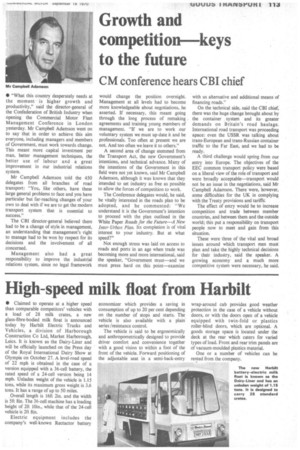Growth and competition—keys to the future
Page 115

If you've noticed an error in this article please click here to report it so we can fix it.
CM conference hears CBI chief
• "What this country desperately needs at the moment is higher growth and productivity," said the director-general of the Confederation of British Industry when opening the Commercial Motor Fleet Management Conference in London yesterday. Mr Campbell Adamson went on to say that in order to achieve this aim everyone, including managers and members of Government, must work towards change. This meant more capital investment per man, better management techniques, the better use of labour and a great improvement in our industrial relations system.
Mr Campbell Adamson told the 450 delegates from all branches of road transport: "You, like others, have these large general problems to face and you have particular but far-reaching changes of your own to deal with if we are to get the modern transport system that is essential to success."
The CBI director-general believed there had to be a change of style in management, an understanding that management's right to manage had to be won by respect for its decisions and the involvement of all concerned.
Management also had a great responsibility to improve the industrial relations system. since no legal framework would change the position overnight. Management at all levels had to become more knowledgeable about negotiations, he asserted. If necessary, this meant going through the long process of remaking agreements and training young members of management. "If we are to work our voluntary system we must up-date it and be professionals. Too often at present we are not. And too often we leave it to others."
A second area of change stemmed from the Transport Act, the new Government's intentions, and technical advance. Many of the intentions of the Government in this field were not yet known, said Mr Campbell Adamson, although it was known that they intended to set industry as free as possible to allow the forces of competition to work.
The Conference delegates would, he said. be vitally interested in the roads plan to be adopted, and he commented: -We understand it is the Government's intention to proceed with the plan outlined in the White Paper Roads for the Future—A New Inter-Urban Plan. Its completion is of vital interest to your industry. But at what speed?"
Not enough stress was laid on access to roads and ports in an age when trade was becoming more and more international, said the speaker, "Government must—and we must press hard on this point—examine
with us alternative and additional means of financing roads.
On the technical side, said the CBI chief, there was the huge change brought about by the container system and its greater demands on Britain's road haulage. International road transport was proceeding apace; even the USSR was talking about trans-European and trans-Russian container traffic to the Far East, and we had to be ready.
A third challenge would spring from our entry into Europe. The objectives of the EEC common transport policy were based on a liberal view of the role of transport and were broadly acceptable—transport would not be an issue in the negotiations, said Mr Campbell Adamson. There were, however, some difficulties for the UK in complying with the Treaty provisions and tariffs: The effect of entry would be to increase competition and trade between member countries, and between them and the outside world; this put a responsibility on transport people now to meet and gain from this situation.
These were three of the vital and broad issues around which transport men must plan and take the highly technical decisions for their industry, said the speaker. A growing economy and a much more competitive system were necessary, he said.






























































































































































































































































































































































































